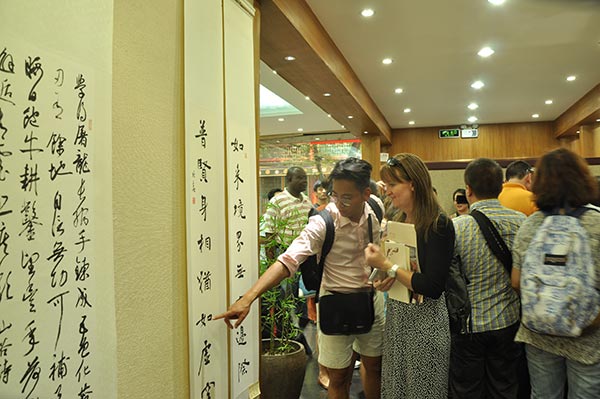
UN members visit the calligraphy and seal-cutting exhibition at the Rongbaozhai Calligraphy Exhibition Hall in Beijing.[Photo by Liu Xiangrui/China Daily]
A special calligraphy and seal-cutting exhibition was held on Saturday at the Rongbaozhai Calligraphy Exhibition Hall to promote traditional Chinese culture internationally.
The exhibition was an important part of the reception of an United Nations delegation visiting Rongbaozhai, one of the most famous time-honored cultural brands in China. The delegation consists of more than 30 members, who are staffers from UN headquarters in New York and its branches in Geneva, Vienna and Nairobi.
The members have all registered for Chinese-language classes organized by the UN's Chinese-language office.
Zhang Xuguang, artistic director of Rongbaozhai, introduced the delegation to the artworks, including more than 40 calligraphy pieces and 20 seal-cutting works by modern artists.
The art pieces, which include works both by celebrated artists, such as Hu Kangmei, as well as by promising young artists, represent professionalism in modern calligraphy, according to Zhang.
The seal-cutting works are award-winning pieces in the First North Lanting Seal-Cutting Exhibition held earlier this year. The artists were also invited to create a group of seal works to give as gifts to the UN headquarters.
"The artworks here are just amazing. I don't do calligraphy but I can read it. It's a pleasure to see these original objects. It is a very unique experience," says Supharidh Hy, 69, a delegation member.
Originally from Cambodia, Hy worked for the UN's audit service for 32 years before retiring in 2006.
He became interested in the Chinese language after a visit to China. He has been in the UN's Chinese class for nearly 10 years, and it remains part of his retirement activities.
Beverly Jones, who is from the United States and works in the UN's Bangkok-based economic and social commission for the Asia-Pacific, registered for the class "to make some new progress" after studying Chinese off and on for more than 30 years.
"I tried doing Chinese calligraphy before and enjoyed it. But I understand it takes many years of practice to become good at it," says Jones.
Mandarin and arts, including calligraphy, have become very popular at the UN in recent years, says He Yong, the UN's Chinese-language coordinator.
Zhang, who is also the deputy secretary-in-chief of the China Artists Association, has visited the UN headquarters in New York three times since 2011 to participate in its Chinese Language Day events, part of an annual celebration of the UN's six official languages.
They carried out exhibitions, teaching and exchange activities related to calligraphy. One of Zhang's students has become a regular calligraphy teacher of Ban Ki-moon, the UN's secretary-general.
"The UN is a good platform to promote calligraphy, " says Zhang, whose studio organized a team of 100 people?most of whom were UN staff members?in July 2013 to write the UN Charter in Chinese calligraphy on a 100-meter-long scroll in the Forbidden City.